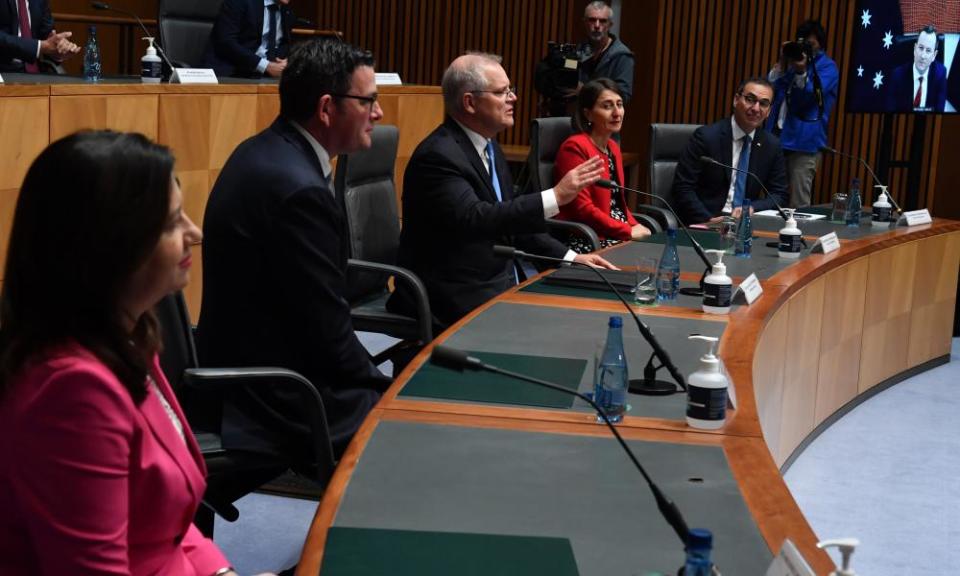Legal experts blast ‘bizarre legislation’ proposed to shield national cabinet from FoI requests

Scott Morrison’s department has come under fire for continuing to try to keep deliberations of national cabinet secret, as legal experts blast a proposed law as an affront to democracy.
The Senate’s finance and public administration committee is examining legislation that would shield the national cabinet – made up of the prime minister and state and territory leaders and formed in response to the pandemic – from freedom of information requests, by making it subject to the same disclosure provisions as federal cabinet.
Related: Rex Patrick, accidental senator: ‘I do cause trouble. But it’s public interest trouble’
Despite the Administrative Appeals Tribunal finding that the national cabinet was not a subcommittee of the federal cabinet as the government claimed, the Department of Prime Minister and Cabinet stood by its position as it sought to defend the proposed laws.
“This is doing no more than making good the decision of the prime minister, earlier in 2020, that national cabinet be established as a committee of cabinet,” the department’s first assistant secretary government division, John Reid, said.
“The government’s view remains that national cabinet was established and intended to be established as a committee of cabinet, as was made clear by the prime minister and the premiers at the time it was established.”
Independent senator Rex Patrick, who launched the AAT challenge, said the department was “delusional”, telling them to “cut the crap”.
“The prime minister is clearly absolutely addicted to secrecy and what he did was quite disrespectful to the conventions, the longstanding conventions of responsible government in Australia,” Patrick said.
Legal experts who attended the committee on Monday also slammed the proposed laws, with constitutional law expert Prof Anne Twomey accusing the government of trying to legislate things that were “not true”.
“It’s just a mess and it shows disrespect for the people, for the courts, everyone to go around asserting in legislation things that aren’t true,” Twomey said.
“It’s frankly bizarre legislation. I mean, why would you assert something that’s not true. Why would you say, in legislation, that a cat is a dog or vice versa,” she said.
The Australian Human Rights Commission president, Prof Rosalind Croucher, told the inquiry that the commission was concerned that the proposed bill would increase secrecy across 15 different acts, with the changes to the Freedom of Information Act of particular concern.
Croucher said the legislation would represent a significant change from how the FoI Act applied to COAG, the Council of Australian Governments, which national cabinet had replaced.
“Australians should be able to seek information about the nature of the decisions made by their representatives. This is even more important in times of emergency. When governments are provided with extraordinary powers then it can affect the lives and rights of Australians in significant ways,” Croucher said.
She said the proposed changes would involve “a permanent change to confidentiality rules over public policy”.
“It’s important that emergency situations do not become a broad justification for unnecessary increases in executive power to the detriment of democracy,” Croucher said.
Isabelle Reinecke, the executive director of the Grata Fund, told the committee that Australia’s freedom of information regime was already restrictive, and the proposed bill would make the situation worse.
“If passed, the proposed amendment will see secrecy increase without appropriate justification, and to the detriment of the public good, and the quality of Australia’s democracy,” she said.
Accountability Round Table chair Fiona McLeod, a respected barrister and also a former Labor candidate, said the bill in its current form was “untenable”.
“The bill subverts responsible government accountability and transparency, and the government’s own commitment to the Open Government Partnership,” McLeod said.
Labor senator Tim Ayres also challenged the department’s evidence to the committee, saying its submission that the national cabinet operated as a federal subcommittee of cabinet had already been rejected by Justice Richard White in his ruling.
“I can’t understand why the department’s coming back to us with the same argument, the same fiction, presented to his honour,” Ayres said.
The department said it had not appealed against the AAT decision, and was unable to say how much it had spent defending the government against Patrick’s action.
In its submission to the inquiry, the Law Council of Australia argued that the existing FoI regime would stop the disclosure of information where necessary.
“Accepting that there is merit in encouraging candid discussion in national cabinet, it is not apparent that secrecy needs to extend to the topics discussed or the information presented to that body,” its submission to the inquiry said.
“That is because (unlike a true cabinet) national cabinet does not manage the budgets or policy agenda of a government and does not face the electorate every three to four years.”
The government says the bill clarifies national cabinet is a committee of federal cabinet.
“Maintaining confidentiality over national cabinet information and discussions is critical to its effective operation and reflects the close relationship that national cabinet has to the federal cabinet,” the Department of Prime Minister and Cabinet’s submission said.
– With Australian Associated Press

 Yahoo Finance
Yahoo Finance 